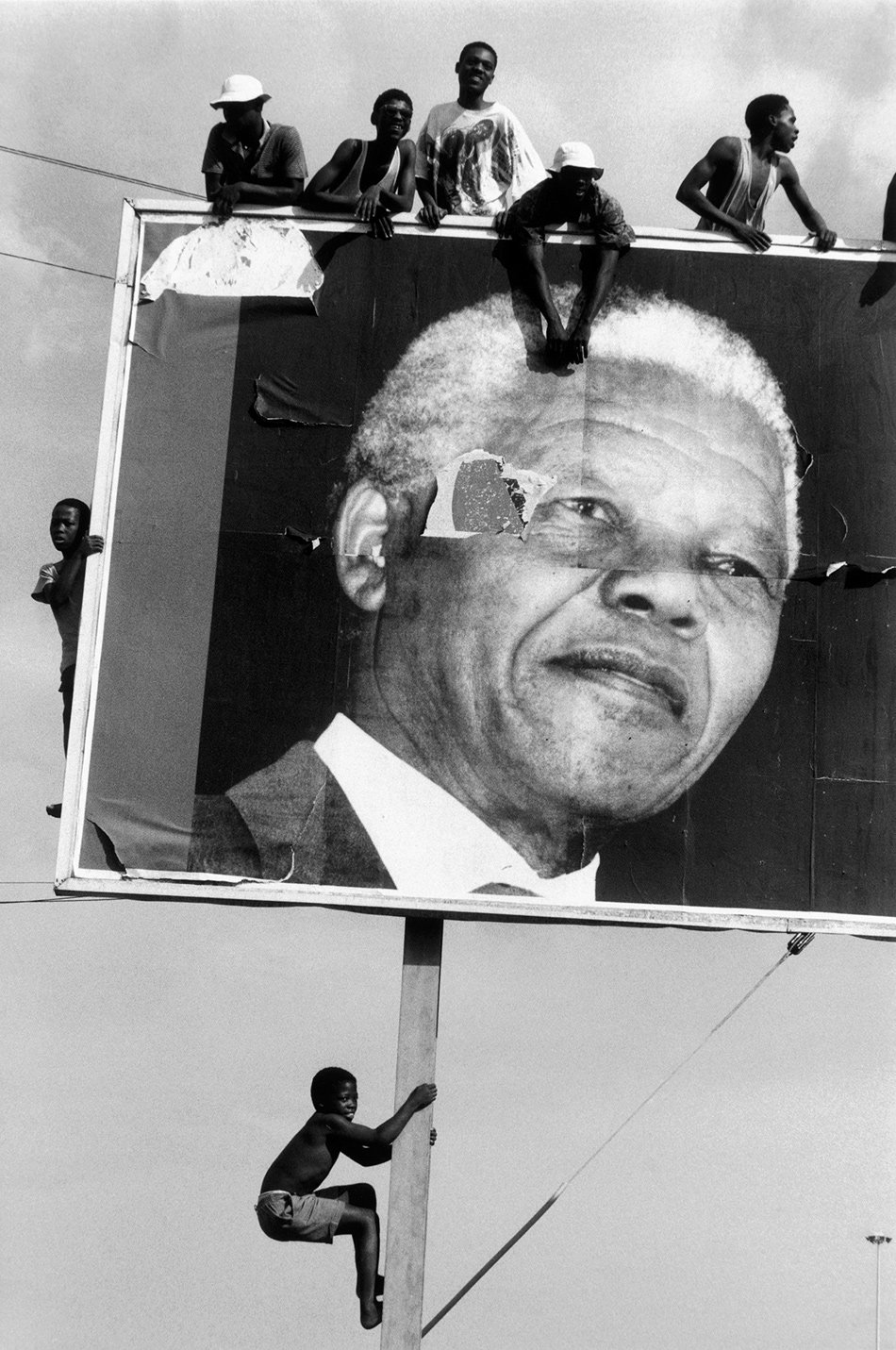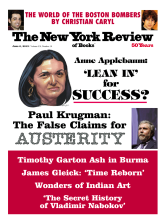In response to:
The Heretic from the March 21, 2013 issue
To the Editors:
I enjoyed Bill Keller’s review of my scribblings [“The Heretic,” NYR, March 21] but must take issue with his view of the tiny but hugely influential South African Communist Party (SACP). “Most…members weren’t all that Communist,” writes Keller, seemingly wishing to impute that our Reds were only pretending to believe in the totalitarian Soviet ideal.
I’m afraid Mr. Keller is wrong. We know this from any number of sources, but let’s hear it from Hilda Bernstein, who lived long enough to acquire a shrewd understanding of herself and the Communist movement of which she was a lifelong part. “Joe and Rusty were hardline Stalinists,” she said in 2004, speaking of her late husband Rusty, a Central Committee member, and Joe Slovo, the most influential Communist of his era. “Anything the Soviets did was right,” said Mrs. Bernstein. “They were very, very pro-Soviet.”
This much could be easily gleaned by reading the SACP journal, African Communist, or just sniffing the air outside the London headquarters of the African National Congress; during the struggle years (1960–1990) the SACP reeked of Soviet orthodoxy, and the ANC reeked of the SACP. As a journalist, you had to be very careful what you said about this. The civilized line was the one ceaselessly propounded in The New York Times—Nelson Mandela was basically a black liberal, and his movement was striving for universal democratic values. Anyone who disagreed was an anti-Communist crank, as Keller labels me.
Two decades ago I would have been stung. Now I am ashamed that my anti-Communist stand was so timid and equivocal.
Keller is correct to say that the SACP declined into insignificance after the demise of the Soviet empire. But we are only just beginning to understand the extent of its influence historically. New research by historian Stephen Ellis shows, for instance, that SACP militants found themselves in an awkward position in 1960, when their secret plans for armed struggle encountered resistance from South Africa’s two most important black politicians—ANC president Albert Luthuli and SACP general secretary Moses Kotane. Rather than back down, these militants co-opted Nelson Mandela onto the Communist Party’s Central Committee and tasked him to “bounce” the mighty ANC into agreement with their position. The result, said veteran Communist Roley Arenstein, was tantamount to “a hijacking” of the mighty ANC by a tiny clique of mostly white and Indian intellectuals.
As yet, no Communist veterans have come forth to denounce Ellis’s account as a McCarthyite lie. I therefore suspect it is true. And that makes useful idiots of almost everyone, including Bill Keller and me.
Rian Malan
Johannesburg, South Africa
To the Editors:
Bill Keller didn’t do his homework. He got it wrong about Nelson Mandela in his review of The Lion Sleeps Tonight, a collection of essays by the South African writer Rian Malan, whom he dismisses as a “crank.”
As former executive editor of The New York Times (and Times bureau chief in Johannesburg, 1992–1995), Keller should have kept in touch with published research, before stating bluntly: “Nelson Mandela and Oliver Tambo were not Communists….”
No proper journalist or academic has ever claimed that Tambo—who led the African National Congress in exile through the decades Mandela was in prison—was a Communist. Scrupulous research, however, by Stephen Elllis, a British professor based at the Afrika-Studiecentrum (Leiden) and the Vrije Universiteit (Amsterdam), published in a historical journal, and in a book issued last year by South Africa’s leading publishing firm, shows that prior to his arrest in August 1962, Mandela was indeed a member of the Central Committee of the South African Communist Party.
The abstract for the paper by Professor Ellis, “The Genesis of the ANC’s Armed Struggle in South Africa 1948–1961,” published in 2011 in the Journal of Southern African Studies—available online—reads:
Revelations made by veterans of the period, and the opening of various archives, have thrown significant new light on the origins of Umkhonto we Sizwe. It is now clear that the South African Communist Party (SACP) was the first component of the congress alliance to decide to launch an armed struggle against the apartheid state, in late 1960, having consulted the Chinese leader Mao Zedong in person. Only later was the issue debated in the senior organs of the African National Congress and other allied organisations. It has also become apparent that the first commander of Umkhonto we Sizwe, Nelson Mandela, was a member of the SACP.
Ellis pursued his researches further with External Mission: The ANC in Exile, 1960–1990, published last year. Jonathan Ball, the publisher, states on its website that the book is “notable for using an exceptionally wide range of sources, including the many biographies and autobiographies by leaders of the struggle, numerous personal papers and the ANC’s own archives, but also foreign archives including in East Germany….”
Advertisement
I write as a former member of the SACP who was a political prisoner (1964–1967), and took part with Professor Ellis in research in the Stasi archives in Berlin in March last year.
Bill Keller’s derogatory put-down of Rian Malan—a courageous, independent thinker who actually lives in South Africa—does him no credit.
Can we not have a better-informed, more rigorous, and more balanced approach?
Paul Trewhela
Aylesbury, England
Bill Keller replies:
I’m grateful to Mr. Trewhela for bringing Stephen Ellis’s research to my attention. I missed it when it was published in 2011. Of course, it is not news that Nelson Mandela and the African National Congress worked intimately with the South African Communist Party. Whether Mandela actually joined the SACP in the early 1960s or had a less formal relationship is a matter of long dispute, but Mr. Ellis makes a persuasive case that, although Mandela has always denied it, he did join the Party for a time, when the ANC and the SACP were launching their phase of “armed struggle” and looking to various Communist regimes for patronage.
I part company with Mr. Trewhela and Mr. Malan on the significance of this evidence. Malan in particular seems to believe that it discredits Mandela, and that the alliance with the Communists damns the ANC as a Stalinist front. That is simply Red-baiting nonsense. Nelson Mandela was, at various times, a black nationalist and a nonracialist, an opponent of armed struggle and a practitioner of armed struggle, a close partner of the South African Communist Party and, in his presidency, a close partner of South Africa’s powerful capitalists. In other words, he was whatever served his purpose of ending South Africa’s particularly fiendish brand of minority rule. I should not have been so categorical in saying Mandela was not a Communist. But he was not a Communist in the values he upheld, the politics he practiced, the constitution he negotiated, or the presidency he held.
I have no illusions about the barbarities of communism, but as someone who covered the final years of the Soviet empire I’m also aware that possession of a Party card doesn’t necessarily tell you much about what a person believes or how a person will behave. Soviet communism was brought down in large part by people who were, or had been, members of the Party. Apartheid was pulled down by many hands, some of them Communist. As Professor Ellis has said, Mandela’s brief, expedient membership in the Party “does not detract from his historic stature.” Mandela, Mr. Ellis told one interviewer, “wasn’t a real convert, it was just an opportunist thing.”
As for Mr. Malan’s assertion that correspondents of the Times portrayed the ANC as a South African replica of the American civil rights movement, that is sheer fiction. Readers of the Times are well aware that the ANC, or elements of the ANC, ran prison camps that make Abu Ghraib seem benign, practiced terrorism before the word was ubiquitous, made alliances of convenience with repellent regimes, engaged in sectarian warfare at home, and, during their years in power, have so far failed to contain corruption and crime or deliver on their promises to lift up the underclass.
As I wrote in December, what Mandela left in his wake was not yet a government, or even a genuine political party, but a liberation movement, with the mentality, customs, and culture of constant struggle. But let’s not forget that the ANC also managed to negotiate an end to white rule without the full-scale civil war that pessimists (including Mr. Malan, during his darker mood swings) predicted. As a result, whether South Africa lives up to its promise is in the hands of all South Africans.




